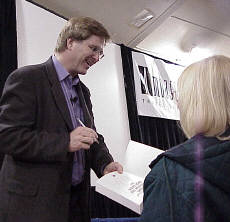 |
|
After his talk, Rick Steves signs books and answers people’s questions about traveling Europe. |
![]()
European budget-travel guru Rick Steves recently gave a talk in Eugene, OR, and Nick and Anthony stopped by the Lane County Fairgrounds to hear what he had to say. Over 800 people came for the two-hour talk, which was sponsored by Ambassador Travel, a local Eugene travel agency.
Steves has been traveling Europe for over 20 years, and he is the author of numerous guidebooks for the European traveler who wants to tred the unbeaten track. He has produced and appeared in various TV travel series and videos, and is owner of the Edmonds, Washington-based tour company Rick Steves’ Europe Through the Back Door Inc.
Though a lot of his talk was geared to the middle-aged and older traveler (who also could easily get by on an $80-a-day budget – a fat sum for many of us!), much of his advice is relevant to travelers of all ages, who want to travel cheaply and to "find the places that don’t have the tourism that they deserve." Steves generally spends about 100 days traveling through Europe each year, to update his books and, well, just to travel. After 20 years, he has a few pointers:
- During the summer, when traveling southern Europe "stop one hour before the beaches" – because that is where all the holidaying Europeans will be. Instead, stay farther out, and check out the small towns and villages along the way.
- "Many of the tourist-trap destinations are palatable at night," so if you are in Salzburg or London or Prague, instead of hitting the major sites and sights during the day, wait until the tour buses have left, and go at night.
- When visiting large cities, pre-book tickets for attractions (the Louvre, for example), instead of waiting in line for two hours.
- Try to meet the locals. Strike up a conversation (but try to avoid inflammatory topics such as politics and religion). Talking to locals often results in you finding out things no guide could tell you, and you may also get invited into people’s homes, really enriching your trip.
- Research. Research the area, the history; for Steves, research is especially important if you are interested in museums and art, so you understand why a painting is "nice" or a field five miles outside the city is important.
- Buy your map only once you get to Europe, then learn to read its key. Doing so can take you to places such as castle ruins, which usually aren’t promoted because, well, they’re ruined.
- Once you have arrived in a city or town, make your first stop (after the loo) the tourist office. There you can stock up on local information, and the staff can let you know about events, such as festivals, that will be happening during your stay.
- Pack light. "If Europe doesn’t have one of your essentials," said Steves, "then maybe you should wonder why 400 million people get by just fine without it."
- Assume the beggars are thieves – and watch your stuff. "If you see a commotion in Europe, it’s a fake commotion!"
- Eastern Europe still is a bit dodgy, even "lawless," in many places, according to Steves. He couldn’t really suggest traveling there.
- If you only have a couple of weeks in a place, you might want to take taxis instead of buses. It may be a bit more expensive, but you also won’t have to wait around as much. Renting a car also can be a good option, as distances are short, and you’ll get better access to smaller, more out-of-the-way places.
- Travel from city to city either by rail or by plane, use public transport to get around the cities, and rent a car to explore the surrounding region and countryside.
- Rail passes have gotten more expensive; however, there now are more flexible options to better fit your travel needs. Air travel is also extensive and not expensive. If you want to avoid entirely vehicles of any kind, you also can look into walking the Continent; for example, "You can hike from France to Slovenia without ever leaving the mountains."
- Go to Turkey – especially if you’re an American – " if you want to spice up your trip." The country still has a bit of a bad rep, now mostly undeserved, and to Steves’ thinking "it’s important for Americans to see a modern Islamic nation" – they should be quite (and pleasantly) surprised.
For more information on Rick Steves, as well as European travel, go to www.ricksteves.com. If you are interested in Rick Steves’ travel books, read on.